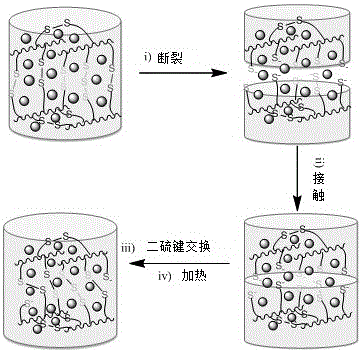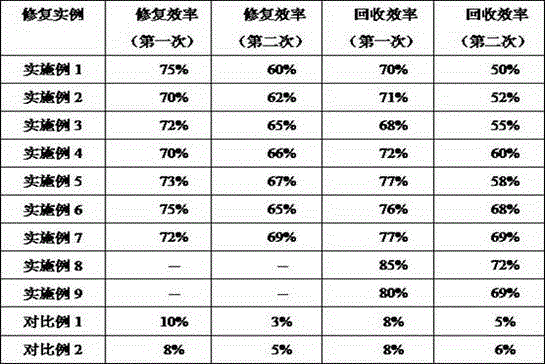A self-healing and recyclable vulcanized rubber, its preparation method and application
A vulcanized rubber and self-healing technology, applied in the field of vulcanized rubber and its preparation, can solve the problems of waste of rubber resources, harsh reaction conditions, complicated processes, etc., and achieve the effects of simple method, easy-to-obtain raw materials, and simple preparation process
- Summary
- Abstract
- Description
- Claims
- Application Information
AI Technical Summary
Problems solved by technology
Method used
Image
Examples
Embodiment 1
[0048] 100 parts of butadiene rubber, 20 parts of pre-grafted nano-silica (the pre-grafting process is: disperse 100 parts of silica in 600~1000ml of toluene to form a sol, and then add 5~20 parts of grafted Branches (one or a mixture of bis-[γ-(triethoxysilyl)propyl] tetrasulfide and bis-3-(triethoxysilylpropyl)-disulfide), After reacting at 80~110℃ for 6~12h, filtered, washed, and dried to obtain grafted nano-silica), 5 parts of carbon black, bis-[γ-(triethoxysilica) acrylic Base] 10 parts of tetrasulfide, 0.1 part of copper chloride, 1 part of zinc oxide, 0.5 part of stearic acid, 1 part of tris(2,4-di-tert-butyl)phenyl phosphite, 2,2,4-tri 1 part of methyl-1,2-dihydroquinoline polymer, 1 part of bis(1,5-pentylene)thiuram tetrasulfide, 1 part of sulfur, and then mix them evenly on a two-roll mill to make You have to mix rubber. After the rubber compound was parked at room temperature for 8 hours, it was thermally vulcanized at 150°C to form a 2mm sheet. After being parked ...
Embodiment 2
[0050] 100 parts of butadiene rubber, 10 parts of pre-grafted nanosilica (the pre-grafting process is the same as in Example 1), 15 parts of carbon black, bis-3-(triethoxysilane propyl)- 10 parts of disulfide, 0.4 part of ferric chloride, 1 part of zinc oxide, 0.5 part of stearic acid, 2 parts of 2,2'-methylenebis-(4-methyl-6-tert-butylphenol), N -(1,3-Dimethyl)butyl-N'-phenyl-p-phenylenediamine 1 part, bis(1,5-pentylene)thiuram tetrasulfide 0.5 part, sulfur 1 part, in turn Mix evenly on a roll mill to obtain a rubber compound. After the rubber compound was parked at room temperature for 8 hours, it was thermally vulcanized at 150°C to form a 2mm sheet. After being parked at room temperature for 24 hours, the mechanical properties of the material were measured by tensile testing. After the tensile specimen breaks and breaks, the two sections are fully contacted and repaired in 110°C air for 12 hours, and the tensile properties of the material are tested again; then the vulcani...
Embodiment 3
[0052] 100 parts of butadiene rubber, 15 parts of pre-grafted nano-silica (the pre-grafting process is the same as in Example 1), 10 parts of carbon black, 12 parts of diallyl disulfide, cuprous chloride 1 part, 0.5 part of zinc oxide, 0.5 part of stearic acid, 2 parts of pentaerythritol diisodecyl diphosphite, 2 parts of 2, 6-di-tert-butyl-4-methylphenol, tetraethyl thiuram disulfide 1 part of sulfur and 1.5 parts of sulfur are mixed uniformly on a two-roll mill to obtain a rubber compound. After the rubber compound was parked at room temperature for 8 hours, it was thermally vulcanized at 150°C to form a 2mm sheet. After being parked at room temperature for 24 hours, the mechanical properties of the material were measured by tensile testing. After the tensile specimen is broken and broken, the two sections are fully contacted and repaired in 110°C air for 12 hours, and the tensile properties of the material are tested again; then the vulcanized rubber composite material is cu...
PUM
 Login to View More
Login to View More Abstract
Description
Claims
Application Information
 Login to View More
Login to View More - R&D
- Intellectual Property
- Life Sciences
- Materials
- Tech Scout
- Unparalleled Data Quality
- Higher Quality Content
- 60% Fewer Hallucinations
Browse by: Latest US Patents, China's latest patents, Technical Efficacy Thesaurus, Application Domain, Technology Topic, Popular Technical Reports.
© 2025 PatSnap. All rights reserved.Legal|Privacy policy|Modern Slavery Act Transparency Statement|Sitemap|About US| Contact US: help@patsnap.com



